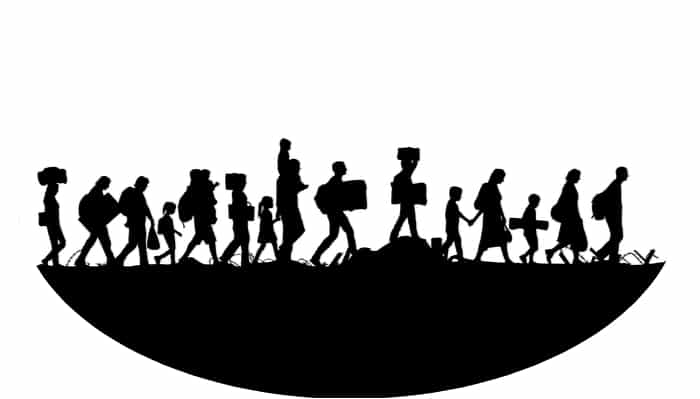In this weeks blog post, current IBDP student Nathalie based in Belgium, speaks about her CAS project working with refugees.
“Refugee awareness day: The harrowing story of an Iraqi musician and how CAS helped me share it”
All names in this article were changed to protect the identity of the individuals mentioned.
2014, the once flourishing Middle East was in the midst of a revolution, the civilians rose against the tyrants: Governments, ISIS, religious factions… they resisted in order to obtain the fundamental rights we take for granted. They became armless rebels, a peaceful army.
The Iraqis withstood the violence for the sake of their homeland, making their will the only aspect that bonded them to their country that was being ceaselessly destroyed by the barrel bombs and gunfire. As the violence increased, civilians became numb to the feeling of terror and recognised if they did not suppress that same will that held them to their country, they would not be able to leave. As we witness on the news, the women, children and men leaving their cities, walking on dirt roads towards an uncertain future, they look forward and honour the deaths of their Iraqi brothers and sisters but will tread the same journey, as “Even if you die…you were not alive here”.
This is the story shared by the millions of Iraqi refugees, displaced in countries they cannot call their own. Throughout this year, one testimony stayed with me, Yazeed’s, an Iraqi musician and English student, who fled Mosul in Iraq after ISIS made the city its headquarters. This is his story and the opportunity the CAS program gave me to share it.
I was first told about CAS in September 2015, a few days after the start of school. My coordinator said it was an opportunity that allowed you to “take a break from your schedule” and “discover aspects of life that extended beyond the program”. I disagreed with the seemingly unambitious sentiment that my coordinator has associated with CAS. I had always had a philanthropical need that I wished I could fulfil through the program, but my dream seem misplaced and I thought it may be time to listen to what was being said in order to avoid being overwhelmed in the IB. Amidst my confusion, I decided to call my grandfather, a veteran Colombian journalist. As I spoke with him, he repeated one phrase “The job of a journalist never stops, if you are to be one, the rest of your life will be looking for the story that defines you”. At first, I was more perplexed than before I had spoken to him, but as I began planning what projects to take on for my CAS program, I realised that my grandfather had reiterated the essence of CAS: these experiences are more than just tasks to complete and reflections to write, they are a journey of self-discovery. Therefore, I had decided that my project had to involve returning to my Colombian and Mexican roots, and given the current refugee crisis, I felt that the only way I could do so was by helping the asylum seekers settling in Belgium, as the same kindness was given to my people in times of conflict.
Our chemistry teacher, had recently visited a refugee camp, placed in the centre of Brussels, called “La Platform citoyenne”, and had met an Iraqi refugee. I was told he was a musician and had taken the perilous journey from Mosul to Brussels. During our CAS session, she had proposed that the IB1 students come to the refugee camp and offer their help. Eager to join the initiative, I signed up. When we arrived at the refugee camp a week later, a stark contrast was visible between the centre and its environment. There were tents crowded with families, surrounded by glass skyscrapers of the country’s largest multinational companies. A look of dismay came upon all our faces in a sudden wave of realisation that this would become a metaphor for our continent’s loss of humanity, as we all remained forcefully complacent in the face of suffering. After this brief reflection, we began working at the shoe distribution centre, where migrants would tell us their shoe size and those of their relatives and amidst the dozens of shoes stacked on shelves, we would match the sizes. We would show them the pair, which they would take, try on, or in some cases (often teenagers!) would kindly ask for a different design. We then spent the rest of our day, cleaning up the camp, helping distribute the boxes of food to the kitchen for supper, and play with the young refugees, drawing and singing, until we had to leave.
As we gathered our backpacks and jackets, I first spoke to Yazeed and I wished to not only hear his incredible story but understand the emotional journey of migrants who were part of the crisis. He told me he had been an English student at Mosul University and was in his last year when ISIS had taken over the city. He fled to Turkey soon after, leaving his family behind in Iraqi Kurdistan where they would be safe, and began his journey to look for an existence where one would not have “one foot in life and another in death”. He stayed in Turkey for a year before crossing the Mediterranean Sea. He had to cross this stretch of water three times before reaching Greece, as under the watch of the Turkish coast guard, the migrants could be caught and directly arrested. As he continued his story, recounting the border crossings between Eastern European countries, where he ran and would not look back, despite the barking of police dogs behind him, and the long days of travelling by foot, where pain was withstood to reach a seemingly unknown destination, I suddenly realised these stories happened on this European continent. The populace could no longer blame their inaction on distance and, therefore, something had to be done counter this mentality that we had all adopted.
At that moment, I decided that my CAS project had to extend beyond helping refugees but help them share their story, in hopes of encouraging a higher level of consciousness to develop in regards to the human experience behind the crisis. I, therefore, decided to create the “refugee awareness day” at my school in December 2015. I would shy away from simply giving these students a moralising speech about our disregard for the struggles of those whose rights have been breached, but decided the crisis could only be explained by an individual who was part of this migration, Yazeed. Therefore, he would re-tell the experience he had witnessing the terror caused by ISIS fighters, the perilous journey he took to escape the violence and the struggles he continues to face today.
After all the administrative steps were taken to set-up the meeting, and with Yazeed’s approval, I began advertising the event by sending e-mails to all students in upper-secondary and meeting with teachers so that they could inform pupils of Yazeed’s arrival. I made stated in my e-mails that he had mentioned he would be willing to answers any questions or address worries that the students had about migrants. We assured that he would do this without any judgement on his part, as we all recognised that a divide between refugees and the host country’s civilians could only be bridged by knowledge. As the organisation of the event came to a close, I thought I had finished planning all that was necessary to ensure the success of the event. However, a few days before his arrival, our chemistry teacher sent me an e-mail asking me to prepare an opening speech before Yazeed’s discussion with students. Despite the stress that came upon me at the time, I saw this as an opportunity to voice my reaction and that those who had heard his story of resistance. After the event, Yazeed and the individuals who helped planned the discussion were congratulated by the student body, and due to the positive feedback, we decided to reorganise a visit a few months later for students in different curriculums. In the meantime I continued to return to the refugee camp and encouraged others to do so as well, as the crisis was far from being over.
As I reflect back on my experience, CAS has allowed me to understand a philosophical question that has been forgotten in the West: our similarities are fundamental and differences, purely superficial. The only thing that separates us from those in Iraq is distance, and at our core we all share Yazeed’s ambition.
CAS makes us recognise that despite the insignificance we may associate with ourselves, we can do the good deeds the world deserves. For me, I was given a purpose; prevent Arabic from becoming the language of suffering.
Iraqi refugees and their struggle are not an abstraction, and we, as individuals who have fundamental human rights such as freedom of speech, movement, and religion, have the moral duty to speak for those who do not, as the complacent are as guilty the criminals.
Speech for “Refugee awareness day”
December 2015
If you are interested in more CAS articles, click here
Read Guest Blogger 3 about CPR





